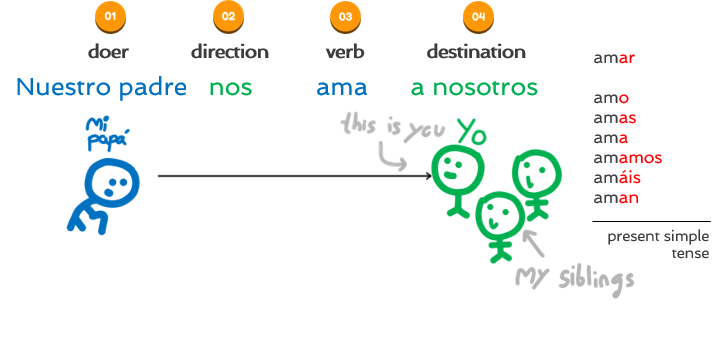Indirect object ‘nos’ and ‘a nosotros’ in Spanish
In this guide, you will learn:
🟢 When to use ‘nos’ and ‘a nosotros’, as indirect object pronouns, along with real-life examples.
Indirect object ‘me’ and ‘a mí’ technical explanation
Imagine you’re with your friends and you tell them: “She remembers us.”
How would you say that in Spanish?”

Answer
Ella nos recuerda a nosotros | She remembers us
Or you can simply say: Ella nos recuerda | She remembers us
By applying the following 4-step method, you’ll be able to construct natural and accurate sentences in Spanish by using the indirect object pronouns ‘nos’ and ‘a nosotros’.
Step 1. Identify the performer of the action / the doer

Ask yourself: who is performing the action?
In this case, it’s the person who is remembering. Since you’re telling your friends that she remembers us, she is the one carrying out the action — she is the one remembering.

Step 2. To whom is the action directed?

Identify what is the direction of the action. This is where the indirect object pronoun comes in.
In “she remembers us“ the action is directed at my friends and me — us.
Therefore, the correct direction (indirect object pronoun) is: ‘nos’

Step 3. Identify the verb

Conjugate the verb recordar based on who is the performer (the doer) of the action.

Ella recuerda ➡️ She remembers
Putting it all together so far until this step:

Step 4. Identify the destination

Now ask yourself: Who is receiving the action of the verb?
This is what we call the indirect object.
We use ‘a nosotros’ to emphasize that the action is directed toward us — my friends and me.
Her action is directed at us — my friends and me.
She remembers us.
So, the appropriate destination (indirect object) is: ‘a nosotros’

Final result
Ella nos recuerda a nosotros | She remembers us
Or simply: Ella nos recuerda | She remembers us
Common mistakes when using the indirect object ‘nos’ and ‘a nosotros’
You might be wondering:
What’s the difference between ‘nos’ and ‘a nosotros’?
‘Nos’ translates to us and is placed before the verb, as you saw in Step 2.
‘A nosotros’ can also be translated as us , but it comes after the verb, as explained in Step 4.
Don’ts
❌ Ella recuerda nos
❌ Ella recuerda a nos
I generally advise against translating word-for-word, as it can lead to confusion.
Instead, aim to internalize the 4-step method you’ve just learned — it will help you form clear, natural sentences in Spanish using the correct indirect object pronouns:

Important note. Remember that the verb goes according who the performer of the action / the doer is:



Still stuck in translator mode when speaking Spanish? Time to upgrade!
Our brand new course is here to help you use pronouns like me, te, nos, le, les, lo, and la with confidence — and sound way more fluent.
When to use a nosotros ?
❓What is the difference between ella nos recuerda and ella nos recuerda a nosotros?
Imagine you’re talking to your friend about your college teachers, and you tell him that your math teacher doesn’t remember either of you—but your art teacher does.
🔹You say: “I’m sure our math teacher doesn’t remember us, but Lauren, our art teacher, really does.”
🔹You say: Estoy seguro de que nuestra profesora de matemáticas no nos recuerda, pero Lauren, nuestra profesora de arte sí nos recuerda a nosotros
We use a nosotros to emphasize the contrast between one teacher who doesn’t remember you and another who does.
However, leaving it out doesn’t change the meaning, tone, or formality of the sentence—it simply adds a bit of emphasis.
❓Is one more formal than the other?
No. It´s not about formality or respect.
🥳🥳🥳
Now that you’ve grasped the basics of using ‘nos’ and ‘a nosotros’ in natural Spanish, let’s look at a few more examples to reinforce your understanding.
Example 1
Imagine you’re talking to your two siblings and you say:
“My parents love us.”
How would you say this in Spanish?

Answer
Mis padres nos aman a nosotros | My parents love us
Or you can simply say: Mis padres nos aman | My parents love us
Example 2
Now, imagine you’re talking to your two siblings again, and you say:
“Our father loves us.”
How would you say this in Spanish?

Answer
Nuestro padre nos ama a nosotros | Our father loves us
Or you can simply say: Nuestro padre nos ama | Our father loves us
⭐Quiz 1
Using the verb necesitar (to need), how would you say
“Our boss needs us” in Spanish?
- Check out the conjugation forms for necesitar below.
- Take a moment to think about your answer before choosing an option.
- And don’t worry if it’s trickier than you expected — that just means you’re learning!


🎯 Want to use Spanish object pronouns like a true native speaker?
At Spanish4dinner, we’ve got you covered when it comes to mastering Spanish pronouns.

Grab your free 100 phrases you’re saying wrong 100 days to get them right eBook and start building a habit that will make your Spanish sound more natural—just like a local!